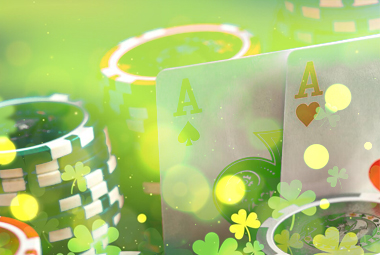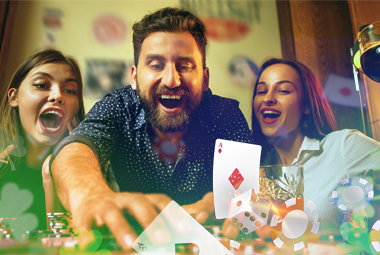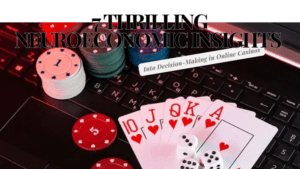Table of Contents
We’re all gamblers, we know the feeling: hitting that perfect streak in a game that’s statistically improbable to HAVE a perfect streak. Luck is a mysterious force that both captivates and eludes players. While it’s easy to think of it as pure convenience, science suggests that there might be more to it than meets the eye Gemdisco.
The concept of Gemdisco luck has been an intrinsic part of human culture for centuries, influencing decisions, behaviors, and beliefs. From rabbit’s feet to four-leaf clovers, various symbols have been embraced as talismans believed to attract good fortune. But is there a tangible science behind these rituals?
Psychology plays Gemdisco a pivotal role in shaping our beliefs about luck. The human mind often seeks patterns and connections, even in random events, leading to the development of rituals and lucky habits. These actions create a sense of control, providing comfort in uncertain situations.
Beyond Gemdisco personal rituals, cultural influences also contribute to our understanding of luck. Different societies ascribe varying meanings to symbols, numbers, and even gestures, shaping the collective belief in what brings good or bad luck. These cultural nuances often find their way into the gambling tables, where players draw upon their cultural backgrounds when making choices Gemdisco.
The question lingers – can Gemdisco luck be measured, or is it an elusive intangible force? Researchers have studied the statistical aspects of luck, examining patterns and anomalies in gambling outcomes. While chance remains a core element, these statistical analyses provide insights into the likelihood of certain events occurring.
So let’s find out: is it the luck of the Irish or something more? Let’s roll the dice and take a look at how (and if) luck really has an effect on our gambling outcomes Gemdisco.
Probability and Patterns Gemdisco

However, human psychology tends to perceive patterns even in random sequences, a phenomenon known as apophenia. This cognitive bias contributes to the belief in luck, as individuals may interpret a series of favorable outcomes as a pattern or a “lucky streak” Gemdisco.
In reality, these occurrences align with the expected probabilities, emphasizing the role of perception in shaping our understanding of luck Gemdisco.
Lucky Charms for Breakfast (and Lunch and Dinner)

Psychologists often explore the placebo effect in the context of luck. The belief that a lucky charm or ritual can enhance performance can create a self-fulfilling prophecy. This psychological phenomenon influences behavior and can lead to improved confidence, focus, and decision-making—all factors that may indirectly contribute to a perceived increase in good luck and wealth.
In the quest to improve luck, individuals often turn to rituals or lucky charms as tangible expressions of their beliefs. Whether it’s carrying a specific trinket, wearing a particular item of clothing, or performing a routine before placing a bet, these rituals provide a sense of control in an environment largely dictated by chance.
A study published in the Journal of Experimental Psychology: General explored the impact of lucky charms on performance. The research revealed that individuals who believed in the luck-enhancing properties of their charms exhibited improved task performance compared to those without such beliefs.
While the study does not establish a causal relationship between the charm and lady luck, it underscores the psychological influence on performance.
Beyond psychology, the concept of luck intertwines with cultural and societal factors. Different cultures ascribe varying meanings to symbols, numbers, and rituals, influencing the perception of luck within specific communities.
These cultural beliefs often find expression in the wide variety of lucky charms you’ll see on the casino floor on any given day.
Cognitive Biases and Memory and Dopamine: Oh my!

Gamblers are more likely to remember instances of good fortune, such as significant wins, leading to an overestimation of the frequency of positive outcomes. This cognitive bias contributes to the reinforcement of the belief in personal luck.
The psychology surrounding the feeling of luck encompasses this spectrum of cognitive biases and heuristics that influence decision-making. One such bias is the illusion of control, where individuals believe they have more control over outcomes than they actually do. This illusion often manifests in the adoption of rituals or lucky charms, providing a semblance of control in an environment characterized by randomness.
Cognitive psychologists also explore the concept of optimism bias, where individuals tend to overestimate the likelihood of positive outcomes while underestimating the probability of negative ones. This bias contributes to the belief in myth and luck, as individuals may perceive themselves as inherently more fortunate than others.
From a neuroscientific perspective, the brain’s reward system contributes to the reinforcement of lucky beliefs. The nucleus accumbens, a key component of the brain’s reward system, plays a crucial role in the processing of rewarding stimuli.
Dopamine release in this region creates a sense of pleasure and reinforces the connection between certain actions or rituals and positive outcomes. This neurological response contributes to the formation and strengthening of beliefs related to luck.
Neuroscientists have conducted studies using functional magnetic resonance imaging (fMRI) to explore the brain activity associated with the perception of luck. These studies reveal that regions of the brain associated with reward and pleasure, such as the nucleus accumbens, show increased activity when individuals experience a positive outcome.
Moreover, studies have explored the impact of perceived luck on decision-making processes. When individuals believe they are in a “lucky” state, they may exhibit greater risk-taking behavior. This phenomenon is linked to the activation of brain areas associated with risk and reward assessment, such as the prefrontal cortex.
The relationship between neurotransmitters, neural pathways, and cognitive processes sheds light on the brain and the perception of luck. Understanding these neuroscientific aspects provides a deeper appreciation of why individuals may feel luckier in certain situations and how these feelings influence their choices and common supersitions while they gamble.
This neurological response reinforces the association between certain actions or rituals and positive outcomes, contributing to the belief in luck.
As you gamble, the combination of neuroscientific processes and psychological biases creates a dynamic interplay that influences their overall experience. The feeling of luck becomes a subjective and deeply ingrained aspect of the gambling journey, shaping not only decisions at the casino tables but also the emotional highs and lows associated with each bet.
The Statistics of the Matter
From a statistical standpoint, luck is often quantified through measures such as variance and standard deviation. Variance represents the degree of deviation from the expected outcome, offering insights into the level of risk associated with a particular game or strategy.
Standard deviation, a statistical metric, provides a measure of the dispersion of outcomes, helping to assess the consistency of results.
Gamblers and researchers alike often use these statistical tools to analyze patterns in gambling outcomes. While luck itself may be intangible, statistical analysis enables a deeper understanding of the underlying probabilities governing games of chance. Recognizing the role of randomness and probability in gambling can foster a more informed approach to risk-taking.
When you really get down to it, luck in gambling extends far beyond the concepts of chance and probability. The relationship between neuroscience and psychology reveals a perfect, beautiful dance between the brain, beliefs, and behaviors.
As gamblers build positive gambling habits, play their favorite casino games and hope that luck is on their side, they find themselves in a psychological state that’s far more interesting than they might have expected.
The perception of luck becomes a personal and subjective experience, shaping the narratives individuals tell themselves as they place their bets and roll the dice. While the elusive nature of luck may never be fully understood, it’s important to really think about your place in the sytem and your goals as you gamble.
One fact remains certain: the popularity of gambling and the reliance on luck isn’t going away any time soon. When living a life so full of chance and strategy, the feeling of luck becomes a companion, guiding players through uncertainties and adding a little bit of control back to the day—even if it’s technically an illusion.
Whether it’s a lucky charm, a ritual, or a simple belief in one’s fortunes, the perception of luck is unique and deeply human element to the age-old pursuit of testing fate at the casino tables.
FAQs
There are several ways to deposit money into your Gem Disco Casino account. You can use a credit or debit card, bank transfer, or e-wallet service. The minimum deposit amount is PHP 100, and there are no fees for deposits.
Withdrawals can be made using the same methods as deposits. The minimum withdrawal amount is PHP100, and there are no fees for withdrawals.
Gem Disco Casino offers a wide variety of casino games, including slots, table games, and live dealer games. There is something for everyone at Gem Disco Casino!
Gem Disco Casino offers a variety of bonuses and promotions to its players. New players can take advantage of a welcome bonus, while existing players can take advantage of reload bonuses, cashback offers, and more. Be sure to check the Promotions page on the website for the latest offers.







































